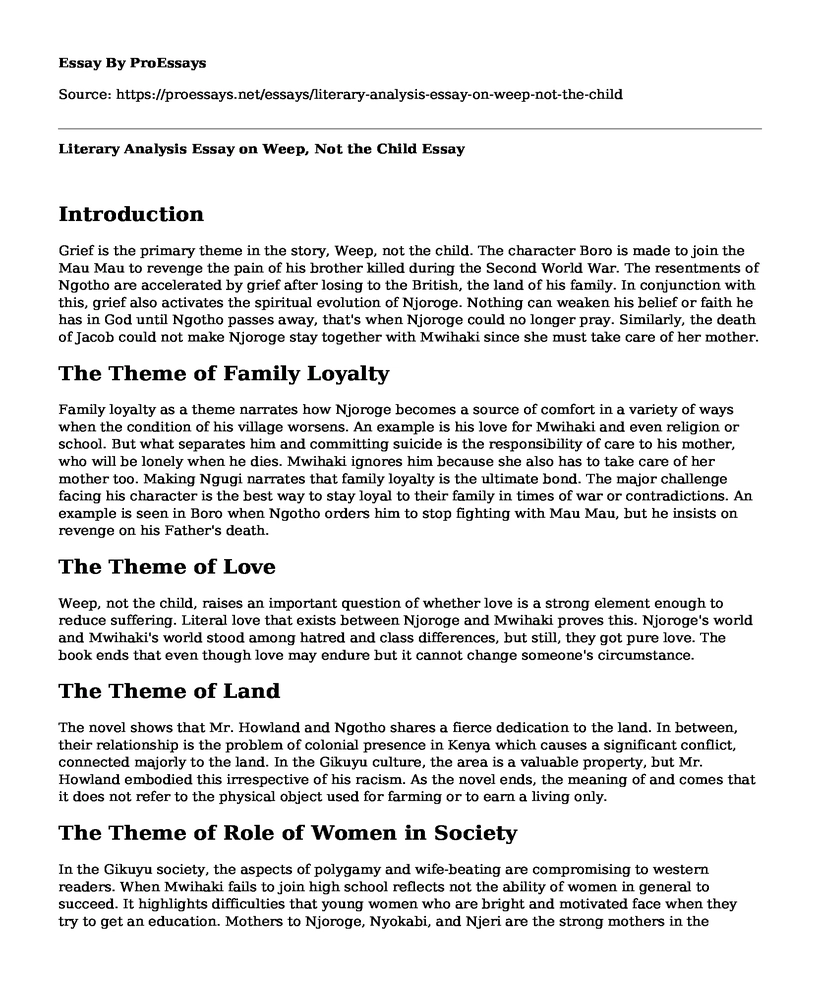Introduction
Grief is the primary theme in the story, Weep, not the child. The character Boro is made to join the Mau Mau to revenge the pain of his brother killed during the Second World War. The resentments of Ngotho are accelerated by grief after losing to the British, the land of his family. In conjunction with this, grief also activates the spiritual evolution of Njoroge. Nothing can weaken his belief or faith he has in God until Ngotho passes away, that's when Njoroge could no longer pray. Similarly, the death of Jacob could not make Njoroge stay together with Mwihaki since she must take care of her mother.The Theme of Family Loyalty
Family loyalty as a theme narrates how Njoroge becomes a source of comfort in a variety of ways when the condition of his village worsens. An example is his love for Mwihaki and even religion or school. But what separates him and committing suicide is the responsibility of care to his mother, who will be lonely when he dies. Mwihaki ignores him because she also has to take care of her mother too. Making Ngugi narrates that family loyalty is the ultimate bond. The major challenge facing his character is the best way to stay loyal to their family in times of war or contradictions. An example is seen in Boro when Ngotho orders him to stop fighting with Mau Mau, but he insists on revenge on his Father's death.
The Theme of Love
Weep, not the child, raises an important question of whether love is a strong element enough to reduce suffering. Literal love that exists between Njoroge and Mwihaki proves this. Njoroge's world and Mwihaki's world stood among hatred and class differences, but still, they got pure love. The book ends that even though love may endure but it cannot change someone's circumstance.
The Theme of Land
The novel shows that Mr. Howland and Ngotho shares a fierce dedication to the land. In between, their relationship is the problem of colonial presence in Kenya which causes a significant conflict, connected majorly to the land. In the Gikuyu culture, the area is a valuable property, but Mr. Howland embodied this irrespective of his racism. As the novel ends, the meaning of and comes that it does not refer to the physical object used for farming or to earn a living only.
The Theme of Role of Women in Society
In the Gikuyu society, the aspects of polygamy and wife-beating are compromising to western readers. When Mwihaki fails to join high school reflects not the ability of women in general to succeed. It highlights difficulties that young women who are bright and motivated face when they try to get an education. Mothers to Njoroge, Nyokabi, and Njeri are the strong mothers in the society, as narrated in the novel.
Bibliography
Devi, Ms V. Anushya. "Narrative Technique in Ngugi Wa Thiong'o's Weep Not, Child." Language in India 19, no. 9 (2019).
Ngugi wa Thiongo. 1985. Weep not, child. London: Heinemann.
Cite this page
Literary Analysis Essay on Weep, Not the Child. (2023, Feb 27). Retrieved from https://proessays.net/essays/literary-analysis-essay-on-weep-not-the-child
If you are the original author of this essay and no longer wish to have it published on the ProEssays website, please click below to request its removal:
- Essay on Medieval Literature - Chaucer and Boccaccio
- The Ballad of The White Horse by G.K. Chesterton Essay
- Nurture in Frankenstein Essay Example
- Essay Sample on Literary Devices and Styles
- The Character of Marcus Brutus in Shakespeare Essay Example
- Essay Example on Humor: Transgression of Taboos & Surprising Deviations
- Essay Example on 18th-Century Literature: Relevance to Modern Times







